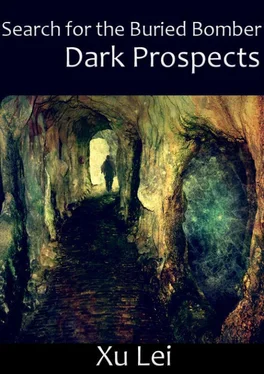Soon enough our theories encountered a serious challenge. After we’d passed beneath a giant waterfall, huge boulders appeared before us, blocking our path and encircled by rapids. We were sucked through the whitewater right into one of the rocks, our raft wedging itself into a crack.
“Fallen rocks,” said Pei Qing, motioning with his flashlight. “They must have ripped from the ceiling during some cave-in.”
“Anyone can see that,” Wang Sichuan shouted. “Goddamn it, who’s going to help me climb up and take a look?”
We climbed onto the rock to survey our predicament. We were shocked. A rocky shoal spread out before us, the river flowing on beneath the stones. The shoal was made of irregularly shaped rocks, the largest as big as the hood of a truck, the smallest the size of a fist, the ground extremely uneven. Black gunnysacks, just like the one we’d dredged from underwater, filled the gaps between the rocky chaos. The sight flooded our eyes. Many of the bags had almost rotted away and the twisted corpses within them jutted out in every horrid pose imaginable, still bound tightly in wire. We were looking into hell.

CHAPTER 9

The Underground Shoal
The gunnysacks were piled five or six layers high. Many of those trapped within had struggled to free themselves, their arms and legs now protruding. In the end their iron fetters had simply been too strong. The corpses were desiccated, their expressions frozen in torment and pain. To examine them in detail was too much to bear.
As soon as we tried to move some of the bags, the wires would twist together and hold tight. Chen Luohu was terrified, utterly scared out of his wits. If he hadn’t taken a piss when we first arrived, I suspect his pants would have been wet through. Pei Qing said nothing, his expression very composed. We dropped anchor. The deputy squad leader clambered up some rocks to have a look at our surroundings. The body-filled shoal continued for a long way. If there weren’t a thousand corpses, then there were at least seven or eight hundred. It was a mass grave. As a prospector, a dead body is something you rarely come across. To see that many, suddenly and all at once, was chilling.
After discussing it as a group, we decided that these had to be workers captured by the Japanese. Moving a bomber deep underground piece by piece would require a huge amount of labor. When it came to negotiating this sort of terrain, there was no more nimble a transportation tool than a human being. Because these activities were strictly confidential, the workers had to be silenced once the job was done. This was the method they had used. Still, there was something strange about it: Why had they stacked the bodies in this specific location? No way could these “corpse bags” have been used as anything other than buffer bags. Was this the site of an explosion? What if the cave-in that caused these boulders to drop and shatter was actually manmade?
But after taking a look around, we couldn’t find the slightest evidence of such a blast. Pei Qing said that deep in the crevices between the rocks you could see where the boulders had been made glossy and smooth by running water. Stones required tens of thousands of years to be scoured to that level of polish. The cave-in must have occurred long, long ago. Moreover, this location wasn’t suitable for demolition work. It would be far too easy to cause a chain reaction across the layers of rock. And the buffer bags had been heaped in a very careless manner. It seemed likely they’d simply been abandoned here. What if these bags were merely extras?
It was now no longer possible to use the oxskin rafts. Our orderly plans were thrown into disarray. The deputy squad leader ordered his corpsmen to begin packing up the equipment. We were responsible for carrying a large portion of it as well. The deflated rafts were extremely heavy. Once we were ready and I shouldered my bag, the weight nearly pushed my feet through the rock.
We began to march, maneuvering ourselves hand over hand across the field of boulders, our progress beyond arduous. Before we had gone too far, we suddenly understood why the Japanese had stacked the corpses here. They were building a road. The piles of corpses filled the gaps between each massive boulder, leveling the path. A wave of nausea and a feeling of absolute terror overcame me. The soles of my feet prickled and I knew only that I wanted to get out of this place as soon as possible.
But you can’t always get what you want. There was no easy way across the shoal. We were leaping from boulder to boulder with huge packs, like stuntmen in training. And if we stepped on the gunnysacks? Our entire foot would sink in, catching on the wire and requiring that we be cut free. We gritted our teeth and marched doggedly on, but in nearly three hours we’d gone little more than a kilometer and even the deputy squad leader had reached the limit of exhaustion. Wang Sichuan looked at me, panting for air. “Old Wu, at this rate, we’re going to be camping in the mass grave tonight,” he said.
He was right. Looking at the darkness up ahead, there was no way to tell how far it went. And hiking for another three hours was not possible. “If we have to, then so be it,” I replied. “These are our compatriots. Dead all these years and they still haven’t spent one night in peace. Tonight we will watch over them. Now, what’s so bad about that?”
Chen Luohu promptly cut in. “I object.”
This surprised me. “Well, then what do you propose?” I asked him.
“I think we ought to keep going and rest when we get out of here,” he said. “Because… um… because we won’t be able to rest well in this kind of place.”
I didn’t know whether to laugh or cry. “Who wouldn’t rest well?” said Wang Sichuan sarcastically. “I’m afraid only you’d have trouble falling asleep. What is it, Luohu, you afraid there’s ghosts here?”
Chen Luohu’s face immediately flushed a deep red. “Well, I am afraid,” he quickly replied. “What’s so terrible about that? My mom carried me but six months before giving birth. I’ve been deficient from the start, a natural coward. Can I be blamed for it? But being a coward never stopped me from serving my country. Whoever wants to laugh at me is laughing at a comrade.”
Wang Sichuan and I exchanged a look—there was nothing to be done about this guy. “Spirits are nothing but superstition,” I said. “Rock is a form of matter. Corpses are a form of matter. Better just to think of all this as stone. There’s nothing to be afraid of. Besides, even if we walked a whole day, we still wouldn’t get out of here. We just don’t have that kind of strength.”
“How do you know?” Chen Luohu replied. “It’s pitch-black up ahead. We might walk another fifteen minutes and be out of here.”
I thought about it, and he did have a point. If it were possible to sleep somewhere else, I too would rather not have to brace myself for the long night ahead. It was here that Pei Qing spoke: “We need not fight about it. Listen to the noises around us. Up ahead, the water still sounds very calm. The direction and flow of the river are not changing. And even if the edge of the water was just out of earshot, we’d still have another two to three hours to go. Now that we’re exhausted, it’s going to be impossible to maintain our previous pace or intensity. The road’s going to be increasingly difficult for us. To continue would be inefficient—a waste of time and energy.” His intonation was neither too fast nor too slow. He was very convincing. “It would be wisest to rest here,” he continued. “I’m in support of setting up camp now, but perhaps we shouldn’t stay as long as we might normally.”
Читать дальше














